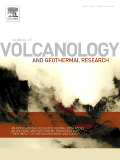
JOURNAL OF VOLCANOLOGY AND GEOTHERMAL RESEARCH
Scope & Guideline
Fostering Innovation in Earth Science Research
Introduction
Aims and Scopes
- Volcanic Processes and Eruptions:
The journal emphasizes research on the mechanisms of volcanic eruptions, including their physical, chemical, and geological processes, as well as the factors influencing eruption dynamics. - Geothermal Systems and Energy:
Studies related to geothermal energy production, including the geochemical, geological, and engineering aspects of geothermal systems, are a central theme in the journal. - Monitoring and Hazard Assessment:
The journal publishes research on various monitoring techniques (e.g., seismic, geodetic, and remote sensing) for assessing volcanic activity and related hazards. - Magma Dynamics and Evolution:
Research focusing on the storage, movement, and differentiation of magma, including the study of magmatic plumbing systems and their implications for volcanic behavior. - Geochemical and Isotopic Studies:
The journal features studies utilizing geochemical and isotopic analyses to understand the origins and evolution of volcanic materials and their implications for volcanic hazards. - Interdisciplinary Approaches:
The integration of various scientific disciplines, including geology, geophysics, geochemistry, and remote sensing, is promoted to facilitate a comprehensive understanding of volcanic and geothermal phenomena.
Trending and Emerging
- Machine Learning and Data Science Applications:
There is a growing trend towards utilizing machine learning and artificial intelligence techniques to analyze volcanic data, enhance eruption forecasting, and automate seismic event classification. - Integrated Monitoring Systems:
Research focusing on the development and application of integrated monitoring systems combining multiple data sources (e.g., seismic, gas emissions, thermal imaging) for comprehensive volcanic surveillance is on the rise. - Climate Change and Volcanic Interactions:
Emerging studies are examining the interactions between volcanic activity and climate change, particularly how eruptions may influence atmospheric conditions and vice versa. - Magma-Water Interactions:
Research into the interactions between magma and water, including hydrothermal systems and phreatomagmatic eruptions, is gaining traction as it is crucial for understanding explosive volcanic behavior. - Geothermal Resource Assessment:
An increasing emphasis on assessing geothermal resources for sustainable energy solutions is evident, reflecting global interests in renewable energy sources and geothermal potential.
Declining or Waning
- Historical Volcanic Activity Studies:
Research centered on historical eruptions and their impacts has seen a decrease, possibly due to a shift towards real-time monitoring and predictive modeling of volcanic activity. - Local Case Studies:
There has been a waning interest in localized, case-specific studies as researchers increasingly favor broader, regional analyses that incorporate multiple volcanoes and geothermal systems. - Purely Theoretical Models:
The focus on purely theoretical models of volcanic processes without empirical validation has diminished, as there is a growing demand for data-driven studies that incorporate field observations. - Traditional Geophysical Techniques:
The reliance on traditional geophysical methods, such as basic seismic or magnetic surveys, appears to be declining in favor of more advanced techniques like machine learning and integrated geophysical modeling.
Similar Journals

Applied Geophysics
Bridging Theory and Application in GeophysicsApplied Geophysics is a premier journal dedicated to the interdisciplinary study of geophysical processes and their applications across various domains, published by SPRINGER. With an ISSN of 1672-7975 and an E-ISSN of 1993-0658, this journal serves as a pivotal platform for researchers, professionals, and students to share their latest findings and insights in the field of geophysics. Operating from China, the journal has established itself within the Q3 quartile in Geophysics as of 2023, reflecting its commitment to high-quality research, even as it ranks #105 out of 165 in the Earth and Planetary Sciences category, placing it in the 36th percentile on Scopus rankings. This makes it an essential resource for advancing knowledge in geophysical methodologies and applications. While it operates in a traditional subscription model, its relevance and timeliness ensure it remains a crucial outlet for emerging scientific discussions. The journal particularly encourages the integration of practical applications with theoretical frameworks, fostering innovation in areas such as environmental geophysics, resource exploration, and hazard assessment.

DOKLADY EARTH SCIENCES
Fostering Collaboration in Earth and Planetary DiscoveriesDOKLADY EARTH SCIENCES is a reputable journal published by MAIK NAUKA/INTERPERIODICA/SPRINGER, focusing on the dynamic field of Earth and Planetary Sciences. With an ISSN of 1028-334X and E-ISSN 1531-8354, this journal offers a platform for researchers to disseminate their findings and insights that contribute to our understanding of Earth systems over a continuous publishing span from 1998 to 2024. It currently holds a Q3 quartile ranking in the Earth and Planetary Sciences category, reflecting an emerging yet significant impact within its field, evidenced by its Scopus ranks where it stands at 123rd in general Earth sciences and 113th in miscellaneous Earth sciences. DOKLADY EARTH SCIENCES aims to bridge research gaps and foster collaboration among a diverse audience including researchers, professionals, and students committed to advancing knowledge in geoscience. The journal stands as a vital resource for those seeking to explore contemporary challenges and innovations within the realm of Earth sciences.
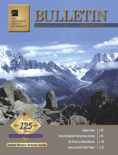
GEOLOGICAL SOCIETY OF AMERICA BULLETIN
Advancing Earth Sciences Through Rigorous ResearchThe Geological Society of America Bulletin (GSA Bulletin), with ISSN 0016-7606 and E-ISSN 1943-2674, is a premier scholarly journal published by Geological Society of America, Inc. Based in the United States, this journal has been a cornerstone of geological research since its inception in 1890, making significant contributions to the understanding of Earth sciences over more than a century. Recognized for its rigorous peer-review process, the GSA Bulletin currently holds a prestigious Q1 ranking in Geology, positioning it among the top 14 journals in Earth and Planetary Sciences in terms of Scopus ranking, reflecting the high quality and impact of the research it publishes. Researchers, professionals, and students alike benefit from its comprehensive coverage of geological topics, including sedimentology, volcanology, and paleontology, which supports the advancement of knowledge in the geosciences. While the journal is not open access, it continues to provide a vital platform for innovative research and critical discussions that shape the future of geology.
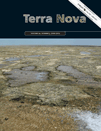
TERRA NOVA
Uncovering the Secrets of Our PlanetTERRA NOVA, published by WILEY, is a leading journal in the field of Geology, with a remarkable impact within the academic community. With the ISSN 0954-4879 and E-ISSN 1365-3121, the journal has been a pivotal platform for innovative research since its inception in 1989 and will continue its influence through to 2024. Ranked in the top tier (Q1) of its category for 2023, TERRA NOVA holds an esteemed position with a Scopus ranking of 67 out of 321 in Earth and Planetary Sciences, showcasing its dedication to high-quality, impactful scientific discourse. The journal covers a diverse range of topics within geology, providing valuable insights for environmental scientists, geologists, and industry professionals. By fostering an interdisciplinary approach, TERRA NOVA remains committed to advancing the understanding of geological processes and their implications for society. With a dedicated readership of researchers, professionals, and students, this journal is essential for those looking to stay abreast of the latest developments and trends in the field.

Russian Journal of Pacific Geology
Bridging Disciplines in the Study of the PacificThe Russian Journal of Pacific Geology is a pivotal resource in the realm of Earth sciences, published by PLEIADES PUBLISHING INC. With an ISSN of 1819-7140 and an E-ISSN of 1819-7159, this journal has established itself as a significant publication for researchers, professionals, and students who explore the intricate geology of the Pacific region. Covering a wide array of topics including Geochemistry, Petrology, Geology, Geophysics, Oceanography, Paleontology, and Stratigraphy, the journal's relevance is underscored by its categorization within Q3 quartile rankings across multiple disciplines in the 2023 metrics. Operating from the United States, its influential publications span from 2007 to 2024, attracting a diverse audience dedicated to advancing the geological sciences. Although not an open access journal, it serves as a valuable repository of knowledge, presenting original research, reviews, and critical discussions that enhance scholarly discourse. The journal is recognized within the global scientific community, addressing significant geological challenges while fostering collaboration and innovation among scholars in the Earth and Planetary Sciences.
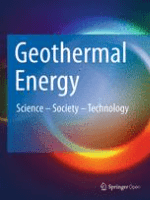
Geothermal Energy
Empowering knowledge in economic geology and geotechnical engineering.Geothermal Energy, an esteemed journal published by SPRINGER, stands at the forefront of research in the fields of Economic Geology, Geotechnical Engineering, and Renewable Energy. With an impressive impact factor and a Q2 category ranking in multiple fields as of 2023, it signifies high-quality research and dissemination in its domain. As an Open Access journal since 2013, Geothermal Energy fosters a broad dissemination of knowledge, ensuring that groundbreaking studies are easily accessible to researchers, industry professionals, and students worldwide. The journal aims to address pressing challenges related to geothermal resources, focusing on innovative methodologies, sustainability practices, and emerging technologies from 2013 to 2024. With its dedicated focus on advancing geothermal energy initiatives, it plays a vital role in contributing to the dialogue on renewable energy solutions and environmental sustainability. Nestled in the United States, this journal not only pushes the boundaries of scientific inquiry but also strengthens the global discourse on energy and the environment.
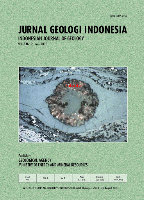
Indonesian Journal of Geoscience
Advancing Geoscience Knowledge for a Sustainable Future.Indonesian Journal of Geoscience, published by the GEOLOGICAL AGENCY, is a vital platform for sharing cutting-edge research in the field of Earth and Planetary Sciences. With an ISSN of 2355-9314 and E-ISSN of 2355-9306, this open-access journal has been making significant contributions to the geoscientific community since its establishment in 2013. Operating out of Bandung, Indonesia, the journal is dedicated to disseminating high-quality research across diverse areas, making it an essential resource for researchers, professionals, and students alike. Recognized in the 2023 Q2 category in Earth and Planetary Sciences, it currently ranks #134/195 among general Earth and Planetary Sciences journals in Scopus, reflecting its growing prominence and academic rigor. The journal seeks to foster scientific discussions by publishing original research, reviews, and case studies that address contemporary challenges and advancements in geoscience, thus contributing to a deeper understanding of our planet. With its commitment to open access, the Indonesian Journal of Geoscience ensures that vital research is accessible to a global audience, encouraging collaboration and innovation in the field.

Geofisica Internacional
Unlocking Earth's Secrets Through Open Access ScholarshipGeofisica Internacional, an esteemed academic journal published by the Instituto de Geofísica at UNAM, Mexico's prestigious National Autonomous University, has been a pivotal platform for advancing the field of geophysics and energy studies since its inception in 1975. This Open Access journal aims to disseminate high-quality research findings, making significant contributions to our understanding of Earth's processes and energy resources. With a current impact factor that situates it in the Q3 category for both Energy (miscellaneous) and Geophysics, it provides a continuous dialogue for researchers, professionals, and students interested in the intersection of these critical areas. Based in Mexico City and publishing articles that span various geophysical disciplines, Geofisica Internacional is indispensable for anyone seeking to stay at the forefront of environmental and energy research.

International Journal of Geophysics
Advancing Geophysical Knowledge for a Sustainable FutureInternational Journal of Geophysics, published by HINDAWI LTD, represents a significant platform in the field of geophysical research and water science. Established as an Open Access journal in 2009, it has committed itself to disseminating groundbreaking studies and innovations that enhance the scientific understanding of the Earth’s physical properties and water dynamics. With a presence in Egypt, this journal maintains a global appeal, supported by its inclusion in prestigious indices, achieving a Q3 ranking in Geophysics and Water Science and Technology as of 2023. Although the H-Index is currently not listed, the journal showcases a reputable ranking in Scopus, placing it in the 34th percentile for Earth and Planetary Sciences and the 26th percentile in Environmental Science. The journal's scope covers a broad range of interdisciplinary topics, making it an invaluable resource for researchers, professionals, and students aiming to stay at the forefront of geophysical advancements and sustainable water resource management. By offering open access to its content, the International Journal of Geophysics ensures that critical research is accessible to a wide audience, fostering collaboration and innovation across global scientific communities.
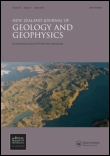
NEW ZEALAND JOURNAL OF GEOLOGY AND GEOPHYSICS
Pioneering Interdisciplinary Discoveries in Earth Sciences.NEW ZEALAND JOURNAL OF GEOLOGY AND GEOPHYSICS, published by Taylor & Francis Ltd, stands as a prominent forum dedicated to the interdisciplinary exploration of geological and geophysical phenomena. With an impact factor that situates this journal in the prestigious Q1 category across key subjects—namely Earth and Planetary Sciences, Geology, and Geophysics—it is a critical resource for researchers, professionals, and students alike. The journal has been operational since 1958 and continues to contribute valuable insights into the complexities of the Earth's processes. Although it does not currently offer Open Access options, its broad readership benefits from an extensive archive of high-quality research findings that span from 1958 to 2024. Located in the United Kingdom, the journal remains a pivotal player in advancing the understanding of Earth's systems, making significant contributions to both academic inquiry and practical applications in the field.